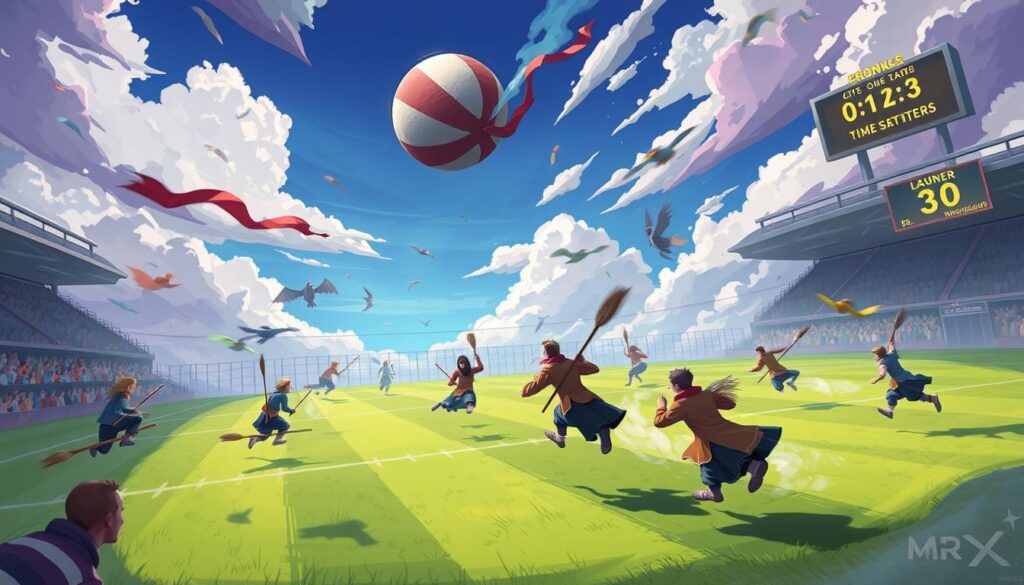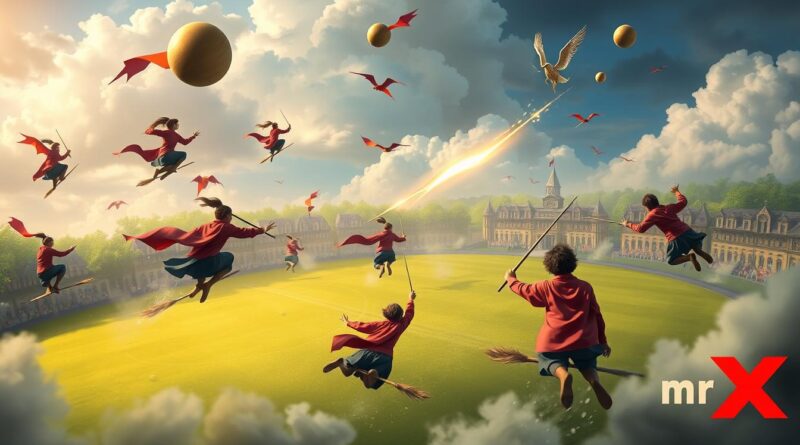Winning Plays: Top Quidditch Strategy Tips
Have you ever felt that rush of adrenaline while flying on your broom? The thrill of teamwork leading to victory is unforgettable. Every Quidditch game brings back memories of teamwork and battles, showing the passion and stakes.
To succeed, just talent isn’t enough. You need solid strategies that blend skill and teamwork. This article will share advanced tips to boost your game. By using these strategies, teams can improve their play and win more.
As we dive in, you’ll learn about the importance of being versatile, optimizing skills, and communicating well. Knowing different arenas can also change the game’s outcome. Get ready to take your Quidditch game to the next level.
Key Takeaways
- Mastering role versatility maximizes team effectiveness.
- Understanding skill point allocation can significantly enhance gameplay.
- Time management is critical for securing a lead during games.
- Team communication fosters coordination and strategy execution.
- Familiarizing yourself with different arenas can lead to tactical advantages.
Introduction to Quidditch Strategy
Learning quidditch strategy tips can really boost a player’s game. It’s all about teamwork and knowing the game well. Players need to balance their own skills with working together as a team.
Every match is different, and being able to adapt is key. Players must change their speed, position, and tactics quickly. This is based on what the opponents and teammates are doing.
Each player has a special role. Chasers aim to score by throwing the quaffle through hoops. Keepers defend against these attempts. Beaters manage the bludgers to keep teammates safe. Seekers catch the Golden Snitch, a game-changing move.
Knowing your role well is very important. It helps players predict what others will do. This knowledge leads to better teamwork and strategy in the game.
The Importance of Role Switching
Role switching in Quidditch is key for keeping players involved and strategic. By using smart quidditch strategy tips, players can switch roles when needed. This keeps everyone engaged and boosts the team’s performance.
Knowing when and how to switch roles is crucial. It ensures every player is contributing to the team’s success.
Staying Engaged During Downtime
When a team has control of the Quaffle, players can stay active by switching roles. For instance, Chasers can take on Keeper duties. This adds defense and keeps their skills sharp.
This move has several benefits:
- It makes teamwork more flexible and effective.
- It helps in intercepting opponents’ passes.
- It gives Chasers a chance to practice defense during quiet moments.
Who Should Switch Roles?
Deciding who should switch roles depends on each player’s strengths and the game’s state. Chasers and Keepers should work together. Chasers can improve their passing, while Keepers can be more aggressive in defense.
Considerations include:
| Position | Optimal Role Switching | Key Skills to Develop |
|---|---|---|
| Chaser | Switch with Keeper | Quaffle Handling, Teamwork |
| Keeper | Switch with Chaser | Unpredictability, Interception |
| Beater | Maintain current role, disrupt opponents | Offensive Skills, Team Communication |
By making role switching a part of their game plan, teams can gain a big strategic edge. It ensures every player is contributing to the win. Being adaptable and mastering quidditch tactics is key to success.
Maximizing Skill Points for Competitive Play
To get better in competitive quidditch, players need to use their skill points wisely. Each role has its own set of skills needed to win. Knowing these skills is crucial for both personal and team success.
Using the right quidditch strategies can make a big difference. It’s all about playing to each player’s strengths.
Essential Skills for Each Position
Players should focus on skills that help them in the game. Here’s a list of key skills for each role:
| Position | Essential Skills | Key Focus Areas |
|---|---|---|
| Chaser | Agility, Scoring Accuracy | Maximizing offensive plays |
| Keeper | Reaction Time, Goal Blocking | Defense strategies |
| Beater | Bludger Control, Disruption Tactics | Support for Chasers and Keepers |
| Seeker | Speed, Focus | Timely Snitch catches |
When to Upgrade Skills and Brooms
Timing is everything when it comes to upgrading skills and brooms. Players should update before big matches to perform at their best. Upgrades should match the best quidditch tactics to stay ahead.
Ignoring this can hurt your team’s chances, even in one-on-one battles. Every little bit helps.
Time Management Strategies in Quidditch
Good time management in quidditch can lead to victory. Players need to use strategies that help score and control the game’s pace. This section will cover how to waste time and endgame snitch catch strategies to improve your game.
Effective Time-Wasting Techniques
Smart time-wasting can help a team win. Here are some tips for managing time in quidditch:
- Know when to take extra time to prepare for a pass. This can slow down the game clock.
- Pause the game during offense to regroup and slow down the opponent’s momentum.
- Play strategically in zones, like as a chaser, to control the game’s speed.
- Use dodging against Bludgers to waste opponents’ time.
- Be creative with moves to keep the game exciting while managing the clock.
- Keep upgrading your team to improve gameplay and stay efficient.
- Change roles wisely, like switching to the seeker position, as conditions change.
- Remember to upgrade characters and brooms to get the most out of them.
Endgame Strategies for Snitch Catches
The endgame can change the game’s outcome. Here are strategies for successful snitch catches:
- Time your snitch catches perfectly; every second matters for points.
- Work with beaters to put pressure on the opposing seeker, making it harder for them to catch the snitch.
- Have a clear plan as a seeker to start your pursuit at the right time.
- Watch the game clock closely; catching the snitch too soon can cost you points.

By learning these time management strategies, teams can boost their chances of winning. They’ll stay competitive in every match.
Mastering Quidditch Tactics
Learning advanced quidditch techniques is key for any team wanting to improve. A well-thought-out expert quidditch game plan can help teams win, even against tough opponents. Every player needs to practice to use tactics smoothly during games, changing strategies as needed.
Good tactics in quidditch come from working together on the field. Seekers do well by quickly turning without losing speed while chasing the Golden Snitch. This chase can earn 30 points. They must stay focused on the Snitch, ignoring other players’ distractions.
To do well in quidditch, teams can use many strategies:
- Using the focus feature to keep an eye on the Snitch while avoiding obstacles.
- Flying through the Golden Rings left by the Snitch helps catch it faster.
- Smartly bumping into the opposing Seeker can slow them down, giving your team an edge.
- Keeping an eye on Beaters and their Bludgers helps avoid trouble during important moments.
Being flexible and improving these skills helps teams handle quidditch’s fast pace. Players should practice a lot, using training modes in different platforms. Making smart choices in the game and adapting to challenges helps teams succeed.
| Tactic | Description | Benefits |
|---|---|---|
| Quick Turns | Ability to change direction swiftly without losing speed. | Allows Seekers to maintain close pursuit of the Snitch. |
| Drifting Mastery | Following the erratic movements of the Snitch. | Increases chances of catching the Snitch by being persistent. |
| Strategic Bumping | Interrupting the other Seeker’s path or momentum. | Creates opportunities for your team to score points effectively. |
| Awareness of Defense | Monitoring opponents, particular Beaters. | Helps avoid potential disruptions during critical plays. |
Combining these advanced quidditch techniques with a solid game plan makes a strong team. As players get better and come up with new strategies, the game becomes more exciting and rewarding.
Strategies for Chasers: Scoring Goals Consistently
Chasers are key to any Quidditch team, focusing on scoring goals. They need to master various skills and tactics. This helps them work well with the rest of the team.
Best Skills for Chasers
Chasers should work on specific skills to get better. Important skills include:
- Possession Control: Keeping the Quaffle gives more chances to score.
- Dynamic Shooting Techniques: Trying different shots keeps goalkeepers on their toes and boosts scoring chances.
- Communication: Clear communication with teammates improves gameplay and scoring chances.
- Adaptability: Being flexible with opponent strategies helps Chasers find weak spots.
Passing Techniques for Effective Team Play
Good passing is crucial for winning plays. Chasers need to work well with Beatters and Keepers for great scoring chances. Here are some techniques to try:
- Quick Passes: Fast, accurate passes can break up defenses and open up scoring chances.
- Diagonal Passing: This makes it hard for defenders to guess your next move.
- Cross-Pitch Plays: Playing on the opposite side of the pitch can draw defenders away, making space for shots.
- Support Play: Always be ready to receive a pass, keeping the ball moving.
Keeper Tactics for Maximum Defense
The Keeper is key in defending against the opposing team’s Chasers. Good quidditch strategy tips for Keepers include improving defensive skills and staying in the right spot. By practicing intercepting and watching Chasers, a Keeper can catch more.
Knowing competitive quidditch tactics is crucial for success. Using the Playcaller ability helps Keepers set up rings that speed up teammates. This adds a strategic layer to defense. Keeping a space for Chasers to move quickly helps both defense and offense. Training modes are great for mastering these tactics.
Here are some key tactics and skills for Keepers to boost their defense:
| Tactic | Description | Benefits |
|---|---|---|
| Optimal Positioning | Maintain a central position between the rings to block scoring attempts. | Reduces scoring chances from opposing Chasers. |
| Intercepting Techniques | Practice intercepting Chasers using agile movements and anticipatory skills. | Improves possession control and creates scoring opportunities. |
| Variable Movement | Keep unpredictable movement patterns to evade Beaters’ challenges. | Prevents opponents from easily predicting positioning. |
| Effective Communication | Fusion with team players to enhance defense and transition to offense. | Strengthens teamwork and increases scoring chances. |
| Routine Drills | Utilize drills that build positioning and movement awareness. | Enhances overall team success and individual skill. |
By using these strategies, Keepers can keep a strong defense and help their teammates. Teamwork and communication are key. They not only protect the hoops but also lead to smart attacks on the opponent’s goal.
Beater Roles: Controlling the Bludgers
Beaters play a key role in quidditch, shaping the game’s flow by controlling the Bludgers. It’s important for Beaters to learn advanced quidditch techniques to make a big impact. They need to work together and communicate well to build a strong offense and defense.
Effective Beater Strategies
Beaters can improve their game by using smart strategies. Here are some effective tactics:
- 1.5 Bludger Strategy – This method puts a lot of pressure on the opposing team by taking away their defensive Bludger. It helps in scoring.
- Anticipation of Opponent Movements – Timing is everything when aiming at opponents, like Seekers. Beaters should guess where they’ll move to hit them right.
- Defensive Positioning – Using Bludgers to defend teammates can change the game’s direction. Protect your teammates by blocking incoming Bludgers.
- Adaptability – Beaters need to change their approach as the game goes on. They should switch between offense, defense, and disrupting the Snitch.
Team Coordination and Communication
Good teamwork makes a Beater’s job easier. Here are key points to focus on:
- Clear Communication – Talk over strategies with teammates before and during the game. Make sure everyone knows what’s happening.
- Coordinated Attacks – Work with other Beaters to carry out plans. For example, one Beater can attack while the other covers.
- Real-Time Adaptation – The game changes fast. Beaters should keep talking to adjust their plans as needed.
Putting the team first can really make a difference. Using professional quidditch advice and practicing these advanced quidditch techniques improves skills. It also helps build strong team bonds.
Advanced Techniques for Seekers
Seekers are key in Quidditch, aiming to catch the Golden Snitch. They need advanced skills to win. This part talks about top strategies and how to make Seekers better.
Catching the Golden Snitch
Catching the Snitch is not just about being fast. It’s about knowing its path and guessing where it will go. Seekers must be good at moving their body and broom to catch it.
Drills like “Squat Seeking” and “Shoulders” help them stay low and sneak past defenders. Being unpredictable and fast is crucial for catching the Snitch.
Optimal Building for Seekers
To be a great Seeker, focus on agility and stamina. These help them last long in games. Customizing brooms and abilities to fit their style is also important.
Training in catching is key for Seekers. It prepares them for real games. Knowing how positions work together helps the team win.
Effective Quidditch Strategies for Communication
Good communication is key in quidditch. With everyone working together, clear talks make the team stronger. Players need to talk well, so everyone knows the plan. This teamwork boosts the team’s chances of winning.
During the game, quick talks can change everything. Players should use signals or words for actions like passing the quaffle. This helps them move fast against opponents.
- Crisp Calls: Make loud and clear calls for passes and plays to foster a dynamic flow.
- Pre-Game Huddles: Discuss strategies and any changes to tactics before the match begins.
- Visual Signals: Utilize hand gestures or specific looks as non-verbal cues during intense moments.
Good communication helps players know their roles. Beaters tell teammates about bludger positions. Keepers share plans to protect their hoops. This keeps the team ahead, leading to more chances to score.
With strong communication, teams are more likely to catch the snitch. This can lead to a winning play.
Importance of Arena Familiarization
Knowing each arena’s unique features can boost your quidditch game. Players who understand their surroundings can use the arena’s layout to their advantage. This knowledge helps teams play better and prepares them for different challenges.
How Layouts Affect Strategy
Arenas have different designs, each changing the game in its own way. Some arenas are tight, making quick passes and fast plays better. Others are big, allowing for long shots and open-field plays. It’s important to know these differences to adjust your strategy.
Teams that do well in one arena might struggle in another. So, it’s key to have strategies that work in many places.
Adjusting to Different Playing Environments
Players need to be flexible and change their game plan based on the arena. Things like wind and how clear it is can change the game a lot. By practicing in different places, teams get better at adapting and communicating.
Planning and rehearsing your strategies helps you stay sharp, no matter where you play.
Adapting to Opponent Strategies
Success in Quidditch depends on understanding and responding to opponents. Developing a good game plan means always analyzing competitors. This helps both individual players and the team as a whole.
Recognizing Patterns and Tactics
Watching an opponent’s gameplay often shows their patterns. Teams can then plan how to counter them. For example, if a team always uses strong defense, opponents should look for weaknesses.
Teams that adjust their tactics to match strong opponents stay ahead. This is key in competitive play.
Good communication helps teams make quick decisions. Players should share feedback to make fast changes. This can surprise opponents and turn the game around.
Using advanced techniques means thinking ahead about opponent formations. Teams should use their strengths and adapt to opponents. Finding the right balance is crucial to keep their own style.
Defensive strategies are important, like when facing teams that control the midfield. This can stop opponents from taking over the game.

Training and Practice Tips for Improvement
Improving your skills is key to staying ahead in Quidditch. There are many training methods and tools to help you get better. By working on your techniques and learning from mistakes, you can help your team win.
Using good quidditch strategy tips is important. It helps you outsmart your opponents.
Utilizing Training Mode for Better Skills
Games like Harry Potter: Quidditch Champions have training modes. These let you practice without the stress of a real game. You can work on skills like catching the Golden Snitch or controlling Bludgers.
Doing drills in training mode helps you get better. It makes your movements smoother and improves your game.
Analyzing Your Gameplay
Looking at your gameplay is important too. Watching footage helps you see how you did. It shows what you did well and what you can improve on.
Staying positive is also important. It helps you focus on getting better. By analyzing your game and staying positive, you can keep getting better at Quidditch.
FAQ
What are some effective quidditch strategy tips for beginners?
Beginners should focus on teamwork and communication. Learning about player roles and practicing passing and catching are key. These skills improve gameplay a lot.
How can role-switching improve a team’s performance?
Role-switching keeps all players active and prevents boredom. It makes teams more adaptable and supportive. This boosts overall team performance.
What should players prioritize when maximizing their skill points?
Players should pick essential skills for their position. Upgrading these skills is crucial. Regularly check your strengths and weaknesses to use skill points wisely.
What are some crucial time management strategies in quidditch?
Using time-wasting tactics can disrupt opponents. It helps your team score. Focus on keeping possession and timing Snitch catches for the best results.
How can Chasers improve their goal-scoring opportunities?
Chasers need to work on passing and communication. Being in sync with teammates creates more chances to score. This leads to success in offense.
What defensive tactics should Keepers employ?
Keepers should improve their catch radius and positioning. Understanding defensive flow helps them react to opponents better. This improves defense.
How can Beaters effectively control the Bludgers?
Beaters need clear communication and teamwork. Controlling Bludgers helps teammates execute plays. It also neutralizes opponents’ threats.
What are some advanced techniques Seekers can use to catch the Golden Snitch?
Seekers should study Snitch patterns to improve catching. Being agile and fast is key for this role. It makes them effective.
Why is communication vital during a quidditch match?
Good communication helps teams coordinate strategies. It enhances teamwork and gives a competitive edge. This is crucial for winning.
How can players assess and adjust to opponent strategies effectively?
Players should recognize opponent patterns and adapt tactics. Being flexible is key for competitive success. It helps win matches.
What training tips can lead to continuous improvement in quidditch?
Use training modes to practice skills. Reviewing gameplay footage helps identify areas for improvement. Continuous feedback refines techniques and keeps you competitive.
Source Links
- Quidditch Champions: 5 Tips To Win More Games
- Harry Potter Quidditch Champions Tips and Tricks | Driffle
- Harry Potter Quidditch Champions complete Beater guide – Backdash
- 5 Beginner Tips For Harry Potter: Quidditch Champions
- Harry Potter 101: Quidditch part one | Wizarding World
- 10 Essential Harry Potter: Quidditch Champions Beginner Tips
- Quidditch Champions: Tips For Playing Chaser
- Quidditch Champions: Tips For Playing Keeper
- Fantasy Quidditch Draft Guide
- Mastering Snitch-on-Pitch: 3 Proven Strategies
- 8 Best Tips For Winning Matches In Harry Potter: Quidditch Champions
- Harry Potter Quidditch Champions: Tips For Playing Beater
- Quidditch Champions: Tips For Playing Seeker
- Magic of Harry Potter Quidditch Champions: 101 Ultimate Guide
- House Points Guide | Hogwarts Cafe
- How to play Chaser in Harry Potter Quidditch Champions
- Microsoft Word – Quidditch-Handbook-FOUND-SOME-TYPOS-BUT-SUPPOSEDLY-FINAL-VERSION.docx
- Magic of Harry Potter Quidditch Champions: 101 Ultimate Guide
- Quidditch Champions: Which Position Is Right For You? (Seeker, Chaser, Beater & Keeper Explained)
- Dear Coaches – Clueless About Tactics – Quidditch Canada
- How to play Beater in Harry Potter Quidditch Champions
- beater strategy – The Eighth Man
- Magic of Harry Potter Quidditch Champions: 101 Ultimate Guide
- Harry Potter – mechanics for quidditch? | Tabletop Roleplaying Game Design
- How to Play Muggle Quidditch (with Pictures) – wikiHow
- Quidditch Champions: All Positions, Explained
- Harry Potter: Quidditch Champions – All Positions Explained
- A Parent’s Guide to Harry Potter: Quidditch Champions
- Hogwarts Legacy: All Balloons Locations
- Riot Is Making a Hearthstone Competitor ‘Legends of Runeterra’ – and It’s Great
- What are some effective strategies for adjusting your sports tactics to different opponents?
- Master the Art of Defending in Quidditch!
- Quidditch – A Must Read Comprehensive Guide
- Tuesday Training Tips – Mental Training – Quidditch Canada
- Harry Potter Quidditch Champions Gameplay Guide | Driffle
- Harry Potter Quidditch Champions complete Seeker guide – Backdash




